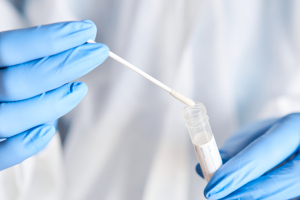Facilities must expand testing capacity over 200% before resuming elective procedures
by
John R. Fischer, Senior Reporter | May 13, 2020

U.S. healthcare providers must expand testing capacity by at least 211% before they can resume full services even partially, including elective procedures and diagnostic services.
Healthcare facilities must expand their ability to test for COVID-19 by at least 211% before they can even partially resume full services, according to a survey by healthcare improvement company Premier Inc.
This includes elective and diagnostic procedures according to the study, which found that 40% of respondents lack the chemical reagents needed to conduct COVID-19 testing, and another 40% lack swabs.
“A core component of any reopening strategy is broad testing capacity to minimize resurgence of COVID-19,” said Premier president Michael Alkire in a statement. “However, current restrictions on capacity and shortages of swabs and reagents force health systems to limit testing, prioritizing patients and front-line workers who are symptomatic. Even with these strict conservation protocols, capacity needs to at least triple before enough is available to support even a partial restoration of non-emergency services.”
Eighty percent of respondents seek to increase their ability to conduct on-site COVID-19 testing. Forty-eight percent currently send COVID-19 diagnostic tests to commercial laboratories for analysis, while 49% conduct testing on-site or at the point of care. Less than 3% leverage at-home specimen collection. In addition, 22% of serology (antibody) tests are sent to commercial labs, while 16% are sent to an on-site central lab or at the point of care.
Eighty-one percent plan to screen all employees for symptoms of the virus, including temperature, before resuming non-emergency procedures, though only 32% are currently able to proactively administer COVID-19 tests to all front-line healthcare workers, and only 22% can test all ancillary employees such as food service workers or janitors, according to the survey.
Without readily available supplies, 44% are limiting testing to employees that are symptomatic, while 59% are restricting re-testing of front-line workers to only those that show symptoms. For patients, 87% are proactively administering tests to those admitted for an elective procedure, but only 27% said they could proactively test patients undergoing a diagnostic service. Fifty-four percent are continuing to bar family members and other visitors from the facility to reduce the spread of the virus and conserve available testing.
Premier aims to help its members with the launch of the COVID-19 Testing Advisory Panel, a group of executives from Premier member health systems, large employers and other leaders who have come together to create robust testing plans, ensure testing is available for employers, and offer advice for the best use of available testing technologies.
“Nearly 60 percent of our survey respondents said they need guidance and best practices to determine which tests they should offer, and to whom, in order to smartly prioritize usage until supply challenges are effectively addressed,” said Alkire. “The COVID-19 Testing Advisory Panel is designed to provide that guidance so that health systems and employers can make dynamic allocations, alleviate risk and minimize the spread of infection.”
The survey was conducted from April 27 to April 30 and received responses from approximately 150 individual hospitals, integrated delivery networks and ambulatory surgery settings, all of which hold Premier membership.
All respondents together account for nearly 400,000 elective procedures per month. Not every respondent answered every question, and Premier did not independently verify data submitted in response to the survey.
|
|
|
You Must Be Logged In To Post A Comment
|
